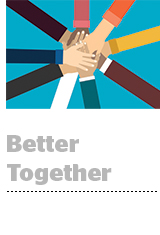 Here’s today’s AdExchanger.com news round-up… Want it by email? Sign up here.
Here’s today’s AdExchanger.com news round-up… Want it by email? Sign up here.
Blurred Lines
Do publishers need to have distinct programmatic and non-programmatic ad sales teams? The New York Times thinks those days have passed, and it has disbanded or absorbed its programmatic team, Digiday reports. The move was part of a larger reorg in December to train all sales teams on programmatic. The shift is also driven by agencies, who want a single point of contact as they shift more budget to programmatic [AdExchanger coverage]. The Times lost some top programmatic talent, but it ultimately sees a single sales org as the right system. “Programmatic continues to be an important element of our business – important enough that we integrated the selling of programmatic into our overall sales organization and organized around a programmatic operations team to support the sellers and our programmatic advertisers,” says a Times spokesperson. More. (For more on The Times’ programmatic strategy, catch Susan Parker, senior director of ad operations and yield, at Programmatic IO San Francisco on April 10–11.)
Under The Impression
Since the beginning of 2018, Facebook’s ad impression growth has slipped but its ad rates have risen sharply, according to data from Facebook marketing partner AdStage. Facebook said it expected usage to decline following its news feed algorithm change early this year. And its engagement was already tailing off, so this steeper drop-off isn’t shocking. Facebook has shielded itself from some criticism by saying its ads and ad rates are decided by an indifferent auction – like recently, when controversy flared up over different pricing between the Hillary Clinton and Donald Trump campaigns in 2016. That said, Facebook supply is apparently scarcer than observers expected, if rates are responding so sensitively to the inventory dip. More at Recode.
Going Direct
Dentsu Aegis programmatic arm Accordant Media wants to reduce supply chain costs by cutting out ad tech middlemen and working directly with publishers. The agency is pushing for preferred access to inventory in an effort to clip ad tech margins, particularly SSPs, marketing chief Kenneth Brinkmann tells Mike Shields of Business Insider. “We are taking out pretty massive fees and reducing them by staggering amounts,” he says. Brinkmann predicts that other large holding companies will follow suit, renewing agency–publisher relationships and allowing more transparency into campaigns. “This will be like going back in time a bit.” More.
Breaking News
A trade group of mostly local papers, the News Media Alliance, is supporting a bill that would suspend antitrust regulations over news companies, Wired reports. The legislation, introduced by Rep. Bill Cicilline (D-RI), would allow the publishers to collectively bargain for rates with tech platforms. “Facebook has done a brilliant job of divide and conquer, playing off news brands with selective beta-test offers and other inducements over the years,” says Gizmodo Media Group CEO Raju Narisetti. Others see the effort as overly protectionist and argue that Facebook has responded to concerns. For instance, after years of discouraging paywalls as bad user experience, Facebook quietly recalibrated in favor of big-name news brands with limited free content. More.
But Wait, There’s More!
You’re Hired!
This post was syndicated from Ad Exchanger.

More Stories
Heineken’s Key to Customer Data Insights? Gen AI Chatbot
Pepsi launches new look
The Garage Podcast: The Future of Media Through Optimization and Personalization